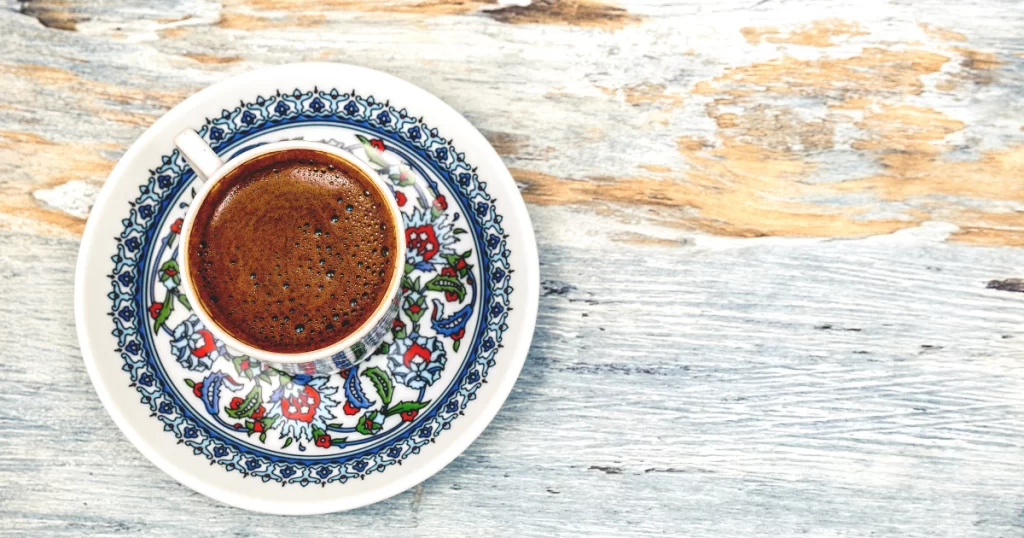At first glance, Egyptian and Turkish coffee seem the same, with their rich aromas, velvety textures, and intense flavors. You are not wrong. Technically, Egyptian coffee is one variation of Turkish coffee. Here you will find out what the differences are between these two unique brews.
I recommend that you check out this to learn what sets Turkish coffee apart from other brews.
Egyptian coffee vs Turkish coffee – The main difference
The main difference is that Egyptian coffee has spices like cardamom, nutmeg, and cloves, while authentic Turkish coffee doesn’t use any spices at all.
Egyptian coffee has a striking resemblance to another beloved beverage known as Arabic coffee.
What is Egyptian coffee?
Egyptian coffee, also known as “ahwa,” is made using a medium to dark roast, which gives it a robust and deep flavor. The beans are typically sourced from different regions, including Ethiopia and Yemen, known for their high-quality coffee beans.
One of the defining characteristics of Egyptian coffee is the use of spices. Traditional Egyptian coffee is often infused with spices like cardamom, nutmeg, and cloves.
How to make Egyptian coffee?
Making Egyptian coffee is a delightful and straightforward process. Here’s a step-by-step guide on how to prepare this flavorful beverage:
- Grind the coffee beans: Start by grinding your medium to dark roast coffee beans to an extra fine consistency. The grind should be similar to that of Turkish coffee, ensuring maximum extraction of flavors.
- Measure the ingredients: For each cup of coffee you want to make, measure one heaping teaspoon of coffee grounds.
- Brewing time: In a small pot or cezve, mix coffee and water and bring it to a boil.
- Add spices: When coffee comes to a boil, add a pinch of cardamom, nutmeg, and cloves.
- Return to heat: Place the pot back on low heat, allowing the coffee mixture to simmer gently. Be careful not to let it boil over.
Serve and enjoy: After boiling the coffee for 3 to 5 minutes, carefully pour it into small cups. Allow the coffee to settle for a moment before enjoying its rich and aromatic taste.

Why do so many coffees share similarities with Turkish coffee?
Various regions, particularly in the Balkans and the Middle East, have coffees that share a resemblance to the beloved Turkish coffee.
The Middle East and the Balkans have long been crossroads of civilizations, serving as meeting points for different cultures, traditions, and trade routes. Coffee, as a precious commodity, followed these paths.
In the Balkans, countries such as Greece, Bosnia, and Serbia have their own unique take on coffee. This coffee, much like Turkish coffee, is prepared using a small pot and a method that involves simmering finely ground coffee grounds.
The result is a strong, aromatic brew with a thick layer of foam reminiscent of the velvety texture found in Turkish coffee. The Turkish conquest of the Balkans played a huge role in this integration process.
Final thoughts
Egyptian coffee, despite its similarity, is a beautiful variation with a flavor profile akin to Arabic coffee.
The next time you enjoy a cup of coffee, remember that it’s more than just a beverage—it’s a story of interconnected cultures and histories.
My journey through renowned bars and coffee shops over five years, as a barista, coffee aficionado, and former bartender, has honed my pursuit for the perfect cup. My passion for coffee isn’t just about the brew—it’s about sharing the knowledge and insights I’ve gleaned along the way.



